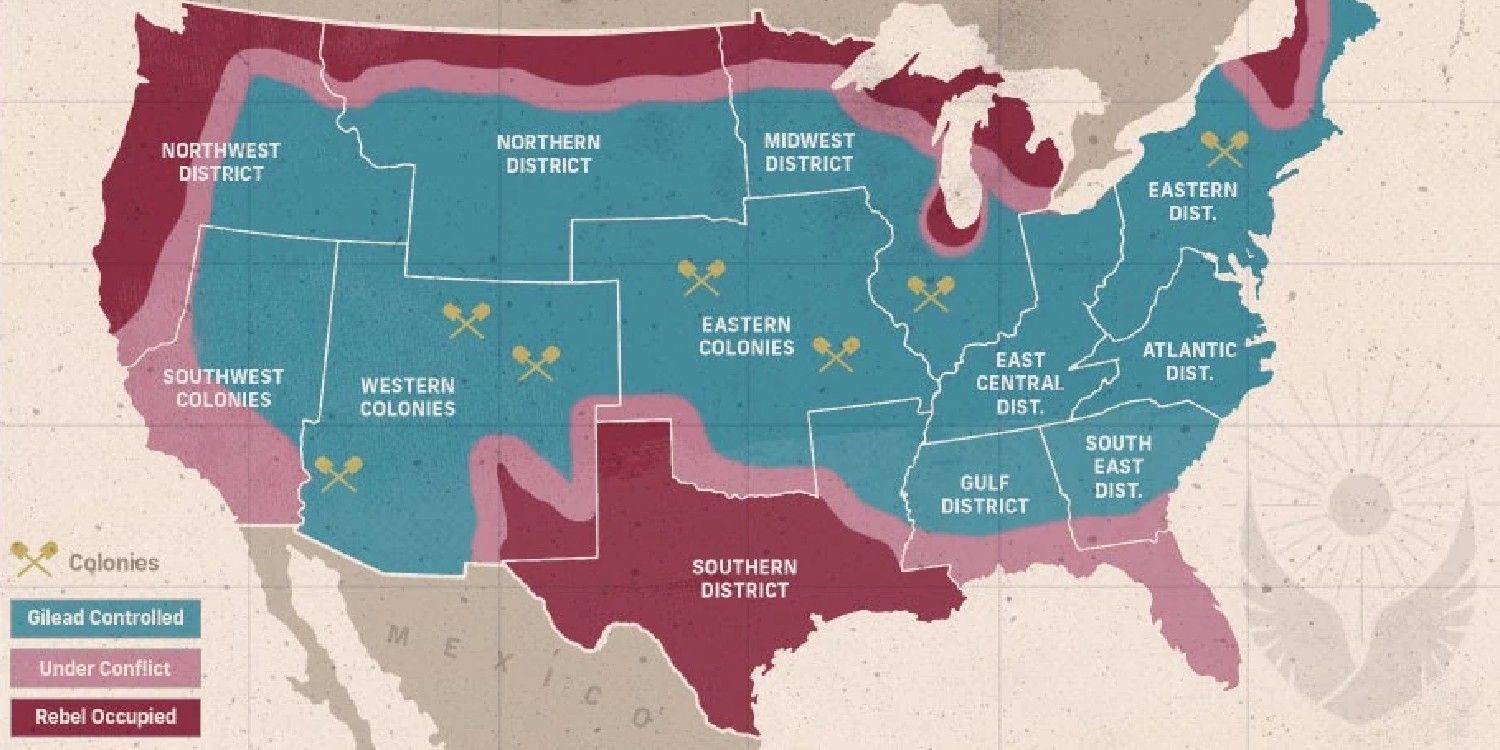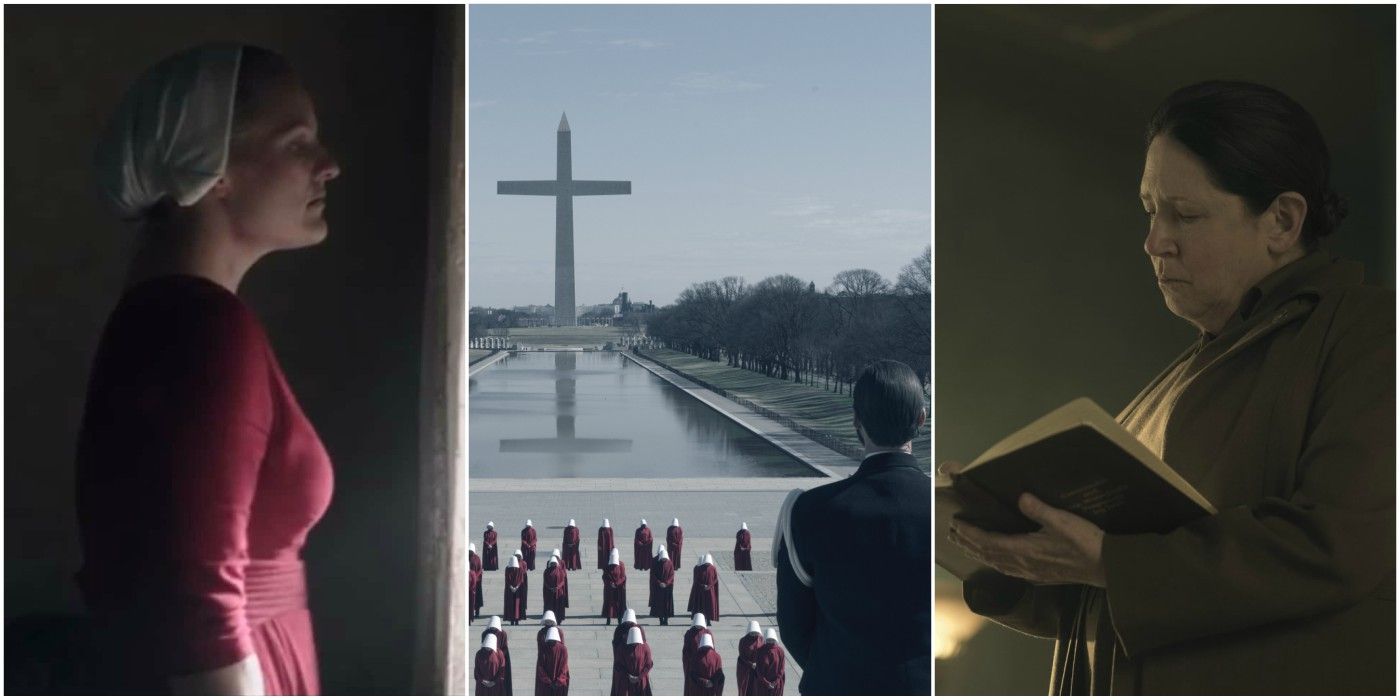As The Handmaid's Tale season 4 takes June to the front lines of Gilead's war against what remains of the United States of America, it raises a complex question: why is Gilead's military so powerful and feared when the country itself is being crippled by economic sanctions?
In the most recent episode of The Handmaid's Tale, "Chicago," Gilead's commanders reluctantly agree to a temporary ceasefire in border cities like Chicago, giving international aid workers a few hours to move in and offer food and medical treatment to civilians. The idea was suggested by Commander Lawrence, as a show of good faith that could persuade other countries to ease their trade boycotts. But while the other commanders go ahead with the plan (after a bit of blackmail), they also order airstrikes on the cities ahead of the ceasefire.
The casual cruelty of the airstrikes and the commanders' disregard for any possible negative consequences highlights one of the main reasons why Gilead's army is so feared: its leaders are motivated more by zealotry than by reason. But Gilead also has the firepower to back up its aggressive military approach. Here's why Gilead's army is so strong despite the country itself being so poor.
Gilead's Army Used To Be The U.S. Army
While the United States does still exist in The Handmaid's Tale, it has been crushed to the edges of its former territory by Gilead's uprising. Anchorage, Alaska, is now the seat of the American government and the map above shows just how much of the mainland has been secured by Gilead. This overwhelming victory is best explained by Gilead managing to secure most of the former U.S. military's troops and weapons in the wake of the President's Day Massacre. Even accounting for losses in the ensuing civil war, Gilead would have been left with the lion's share of the most powerful military in the world.
According to the Stockholm International Peace Research Institute, the United States' military expenditure in 2019 was $732 billion, which far outstrips the country with the next highest military spending, China ($261 billion). The U.S. also currently has 3,800 active nuclear warheads in its stockpile - which, in the world of The Handmaid's Tale, are presumably now part of Gilead's stockpile. Gilead also doesn't need to rely on soldiers enlisting in its army, since people no longer get to choose what job they will do and can instead be conscripted into the armed forces. It's little wonder that other countries are reluctant to directly confront Gilead, even in the face of its military aggression and the horrifying treatment of its people.
Gilead Doesn't Care About Its People
The mismatch between Gilead's powerful military and its struggle with food shortages and currency stability is best understood by looking at the real-world example of North Korea, which in many ways is the blueprint for The Handmaid's Tale's fictional nation. Like Gilead, North Korea has been subjected to economic sanctions due to its extensive nuclear and missile programs, and trade has recently slowed even further due to the coronavirus pandemic. A recent report by the Human Rights Watch quotes a missionary who said, "There is barely any food going into the country from China for almost two months now... There are so many more beggars, some people died from hunger in the border area and there’s no soap, toothpaste, or batteries." Despite this desperate state of affairs, North Korea's leadership has repeatedly refused offers of international aid.
Gilead's bordering countries of Canada and Mexico still have functioning democracies, and therefore the actions of the military are subject to a greater system of checks and balances. When deciding on foreign and military policy, those countries' political leaders have to take into consideration whether or not there will be public support for their actions and what impact they will have on ordinary citizens. Gilead, by contrast, is not held back by any particular desire to protect its own people (other than the commanders and their wives) or any regard for polling numbers (since elections have been eliminated). Much of Gilead's military is deployed domestically in the form of Guardians who patrol the streets with guns, and its people are kept in constant terror of ending up on the wall.
Gilead's Extremist Ideology
Just like a gun can be considered more or less dangerous depending on who is holding it, the global fear of Gilead's army isn't purely because of its strength, but because of the mindset of the people in charge. The country was founded out of a fanatical religious belief that the fertility crisis is God's way of punishing mankind, and this has since been used to justify the bizarre and horrifying practice of turning women into handmaids. But Gilead's approach to the fertility crisis isn't just cruel - it's illogical. Fertile handmaids end up assigned to sterile commanders because of Gilead's staunch refusal to admit that men can be sterile. The stress and abuse that the handmaids are subjected to isn't exactly an ideal environment for producing healthy pregnancies. And sex itself has been framed as a shameful act that should be only be done under only the strictest of parameters (like the handmaids' monthly ceremony, or Nick and Eden's awkward love-making through a sheet with a hole in it).
Given that Gilead is a nation built upon a foundation of religious zealotry, and the first step in its founding was an act of large-scale terrorism, it's no wonder that other countries are nervous about how its military resources might be used. Gilead's leadership could suddenly declare that the only way to truly solve the fertility crisis is through nuclear bombardment of all the "heathen" countries, and from an outside perspective it certainly seems like they're crazy enough to go through with it. Of course, exchanges between the commanders in the show have made it clear that the vast majority of them are self-interested hypocrites who don't really believe in Gilead's religious dogma. But the wall of silence and secrecy around the country means that the rest of the world isn't privy to this, and lives in fear of what Gilead could do next.
The Fertility Crisis
In The Handmaid's Tale season 1, June revealed the extent of Gilead's cruelty to a Ambassador Castillo, a representative visiting from Mexico to discuss the possibility of trading for handmaids. Though the ambassador was clearly disturbed by June's story, she said that she couldn't do anything to help. The global fertility crisis meant that there hadn't been a healthy child born in her town of Xipica for six years, and Castillo had to prioritize her own people's wellbeing above all else. "My country is dying," she told June.
There is a similar state of affairs all around the world in The Handmaid's Tale, and with the fertility crisis looming large countries will be looking to avoid war at all costs. The mass loss of life in World War II was followed by the population being replenished and then growing rapidly, but if World War III happens in The Handmaid's Tale there'll be no baby boom to repair the damage afterwards. With live birth rates catastrophically low, other countries need every healthy man and woman available to focus on creating new life, not being killed in a futile war.





